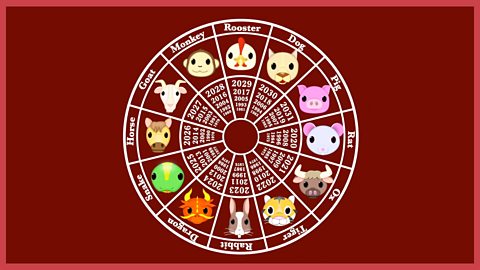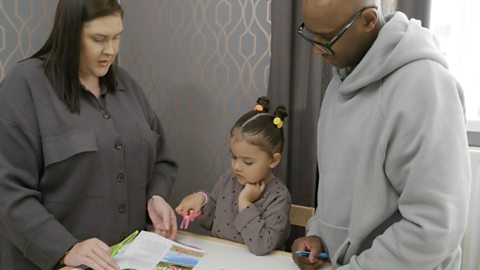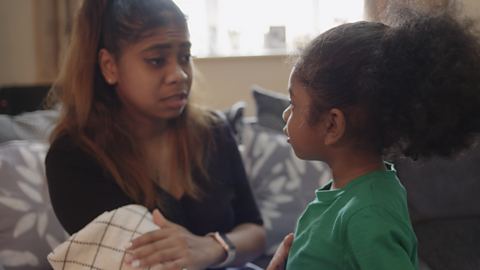Lunar New Year is one of the world’s most popular celebrations. Millions of people from countries who use the lunar calendar, including China, Vietnam and Korea, recognise the start of a new moon, new beginnings and a chance to be with friends and family members.
You might see Lunar New Year or Chinese New Year decorations and parades in a town near you.
So, how might you join in the festivities with your family this weekend? We have some fun activity ideas for you to try at home, with advice from Janet Cooper, a speech and language therapist, on how these activities can help your child’s development…

Make a Chinese zodiac mask
A lot of the cultural celebrations we see in the UK for Lunar New Year are based around Chinese New Year traditions, including the Chinese zodiac. In the Chinese zodiac, each year, starting on Lunar New Year, is assigned one of 12 animals.
On Saturday 10th February 2024, we will begin the Year of the Dragon. The perfect time to create a dragon mask for you and your child!
All you need is some coloured card, scissors (for parent use only), a glue stick, a permanent marker or felt tip, sticky tape and a stick to hold or a piece of string to wear the mask on your face.
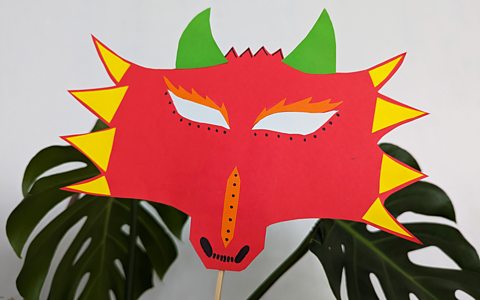
You could also let your child decide if they’d like a mask for the year they were born, or a year they would like to remember…
| Lunar year | Chinese zodiac animal |
|---|---|
| 10th Feb 2024 to 28th Jan 2025 | Dragon |
| 22th Jan 2023 – 9th Feb 2024 | Rabbit |
| 1st Feb 2022 – 21st Jan 2023 | Tiger |
| 12th Feb 2021 – 31st Jan 2022 | Ox |
| 25th Jan 2020 – 11th Feb 2021 | Rat |
| 5th Feb 2019 – 24th Jan 2020 | Pig |
Of course, there are other animals in the Chinese zodiac to choose from - the dog, the rooster, the monkey, the goat, the horse and the snake. Plenty of opportunities to get crafty!
Speech and language therapist Janet Cooper suggests that as well as encouraging your child to name each animal, you could also ask your child questions like, ‘Where does this animal live?’ and ‘What do they eat?’
And while making the mask, Janet says you could talk about the different parts of the animal's face, as well as action words like ‘cutting’, ‘sticking’, or 'drawing', as you are doing them. She also suggests giving your child choices as they go, so they’re involved in the process – even if you take charge of the scissors!
You could ask questions like, ‘How are we going to make it fit us? With a stick to hold or string?’ or ‘What colours shall we use for our dragon?’
A lucky red treasure hunt
Red is seen as a lucky colour in Chinese culture, which is why you see so much of it during Lunar New Year celebrations – from paper lanterns to the red envelopes used to gift money to loved ones (known as 紅包, 'hóngbāo' in Mandarin).
Could you organise a household treasure hunt for your child, themed around the colour red?
Spend a moment before your play time choosing red objects that your child will be able to identify and reach - a book, a toy, maybe a cushion or a pair of shoes.
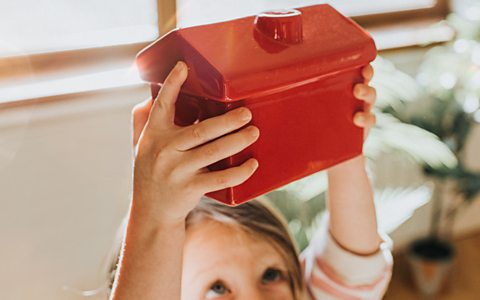
For the treasure hunt itself, Janet suggests describing the object you want your child to find. Tell them what room it is in, what shape it is, or what it might be used for. "This will really help with their listening and understanding skills."
"And if they come back with something else, you could say, 'Brilliant, you found something red, but listen to the clue again.' You might need to give a bit more detail in the clue, but that's really good for developing your child's memory."
"If it's too difficult, you can try matching visually. So, you could take a photograph of the object beforehand and show that to your child during the game for them to go and find it in the house."
Learn how to say 'hello' and 'goodbye' in Mandarin Chinese
If your child doesn't speak Mandarin Chinese, this might be the perfect time to learn a phrase or two!
Where better to start than 'hello'? In Mandarin, this is 你好 or Nǐ hǎo (pronounced 'nee how'). And then there's 'goodbye', which is 再见 or zàijiàn (pronounced za-i-jian). These can be tricky to pronounce perfectly, but Janet says there is value in helping your child to learn these phrases…
"Smaller children are brilliant imitators, so it's great to give them new words to learn," she says.
Even if they can't repeat these new words perfectly, Janet explains that this activity will help develop their phonic skills: listening to how different sounds link together.
"I think there's a social aspect, as well. If your child can say a greeting in another language, it allows interaction with other people from other cultures. They might know a child who speaks that language at nursery or school and be able to practice."
Bonus activity idea
In Chinese culture, the days leading up to Lunar New Year are used for tidying and cleaning the house to dispel any bad luck which has built up over the last 12 months. The perfect excuse to get your little one involved in household chores!
But don't forget - no cleaning on the first day of the new year (10th February), as this is said to remove any good luck your home has received.

